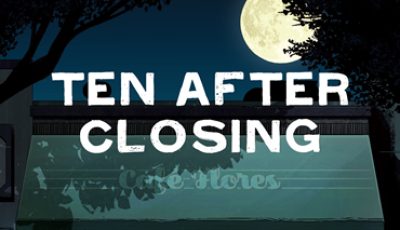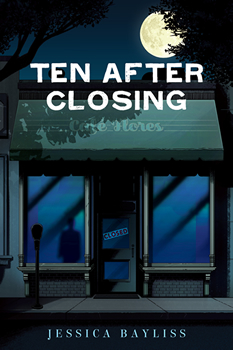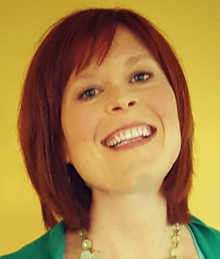

Ten After Closing by Jessica Bayliss
 By Wendy Tyson
By Wendy Tyson
Someone once said that the most important thing a fiction writer can do is to study human psychology. Author Jessica Bayliss has that covered.
With a doctorate in clinical psychology and experience as a psychotherapist, teacher, and researcher, Bayliss uses her understanding of the human psyche to inform her young adult thrillers. Her latest novel, TEN AFTER CLOSING, is a riveting hostage thriller—and a look at the life-altering changes that can come from a traumatic event.
The Big Thrill recently had the chance to sit down with Bayliss to talk about TEN AFTER CLOSING.
Congratulations on the recent release of your young adult novel, TEN AFTER CLOSING. Your novel has an exciting premise: two teens caught in a hostage situation. What can you tell us about the main characters that’s not on the back cover? How have their pasts influenced the people they are when the story opens?
Thank you! I’m so excited and I can’t believe it’s almost time to send it out into the world.
Winny and Scott come from different backgrounds, but both are in a similar situation at the start of the book. Both have really big decisions in front of them, and they’re struggling to feel empowered to make those decisions and act. Winny is stuck in a passive place—she’s let her parents decide much of her path thus far, going with the flow for so long, she isn’t sure how to shift out of that mode. Scott’s been quite active in trying to change his situation, but he’s struggling to see that the way he’s going about it isn’t working. Both are thinking about how others will respond if they put their needs first and are fearful of being assertive. Of course, the life-changing hostage situation at Café Flores impacts how they see things. I really wanted to show them coming to new decisions by the end of TEN AFTER CLOSING, but I can’t say any more without spoilers.
What do you hope readers will take away from this book?
This is a fast-paced hostage thriller, so I hope readers can’t stop turning pages. But, after all the violence that has happened in recent years, particularly centering on teenagers, I also wanted to show a teen character who is in pain and has a chance to use violence as his means of revenge but who opts for a different route. Therefore, it’s also a story of forgiveness and a story about how we really aren’t as different from our enemies as we think. Finally, it’s a love story, so I hope readers will enjoy some swoony romance.
Clearly a crisis situation like the ones the teens find themselves in changes a person. What inspired you to write this novel? Are there certain themes you find yourself drawn to again and again?
Though I don’t include trauma in all my books, and when I do it’s not always the focus, I have noticed it comes up a lot in my writing.
The theme sort of arose organically in TEN AFTER CLOSING, but once I saw it, I wanted to deepen it. I wanted to highlight the theme of abuse and, in particular, the perpetration of abuse across generations. As a psychologist, I work with trauma survivors daily, including people whose trauma situations sometimes involve things they’ve done that they deeply regret—they often have immense shame and anger, and they carry that, even when it’s not theirs to bear.
Obviously, I’m talking about Scott’s story here. I really wanted to show him wrestling with the idea of letting go of the anger and blame he’s placing elsewhere, because that’s what will allow him to let go of the anger, blame, and sense of paralyzing responsibility he places on himself. It’s about letting go of the darkness that fuels the painful emotions so that there is room for the good ones. Though this never pardons the person who’s hurt us, the process is healing. Forgiveness can be for the person who’s hurt us, but it’s always for ourselves.
You have an interesting background—one very suited to writing crime fiction. Can you tell us a little about your career history and your journey to publication?
I never imagined I’d be writing. I started it as a hobby when I was done with my decade-long road to becoming a psychologist about five months after getting my first job. I realized I could actually enjoy leisure time again, and I thought trying to write a book would be a fun way to use that time. I had no idea if I could do it, and I was 97% sure I wouldn’t even finish it. I knew for sure that whatever I wrote would be terrible—and it was. So, I put zero pressure on myself. It was a total experiment that might fail, and if that was the case, that was fine by me. But it didn’t fail, and once I was done with that first book, I knew I wanted to keep going. That’s when my real training to be a writer began.
In addition to writing young adult thrillers, you also write short stories and young adult horror. What are the challenges of writing in multiple genres? Do you find writing in one often inspires ideas for books in another genre?
The hardest part of writing across age groups and genres is keeping on top of what’s out there. Young adult thrillers are very different from adult thrillers, for example, so you have to read a lot more to stay up-to-date. That said, sometimes not being too embroiled within any genre or age group is good; it allows for a fresh perspective, which (hopefully) translates into fresh story ideas.
What advice do you have for authors who are just starting out?
I could talk about this for days, but I’ll do my big three.
First, I highly recommend a routine. Not everyone can write every day, but we can all develop a routine, even if it consists of nothing more than writing for 30 minutes every Saturday morning (or Tuesday night or …).
Second, finish what you start. New ideas are exciting, and endings often come easy. But middles … ah, middles. They can be tough. We need to practice getting through a manuscript. Literally, we need to practice getting to that tough spot where nothing is working and we hate it all but then we keep going and we somehow manage to get to the end. Once we do that a few times, we learn that no matter how hard it gets, we can and will get through whatever project we’re working on. That’s an immensely important confidence-builder for when it’s for real (i.e., our editor has given us a bunch of feedback and a deadline).
Third, find your tribe. One of the best ways to see yourself reach your goal is to be around people who share that goal, especially if they’re a little bit ahead of you. It turns the impossible into something that feels very possible—because we’re watching others achieve it.
What does your writing routine look like?
I write every day, even if for just a little while. I often get up an hour before work to write, and I devote a big chunk of time each weekend. I’m much better in the morning and afternoon, so I tend to stop at dinnertime—unless I’m at a writing retreat. My writing group rents an inexpensive house or Air B&B for a weekend, close to where we live, and we chip in for food and cook, and just hang out and write. It’s so relaxing and fun!
What’s next?
I’m currently finishing up edits on another young adult thriller, which I’ll be sending to my agent soon. Then, I have an idea for an adult thriller, which I can’t wait to start.
*****
 Jessica Bayliss is a clinical psychologist by day and a writer all the time. Author of the young adult horror novella Broken Chords, she has been a lover of thrillers and ghost tales since her days scanning VHS rental shelves—admittedly with eyes half-averted from the gory covers. She also loves to eat, cook, and exercise—in that order—and is a firm believer that coffee makes the world a better place.
Jessica Bayliss is a clinical psychologist by day and a writer all the time. Author of the young adult horror novella Broken Chords, she has been a lover of thrillers and ghost tales since her days scanning VHS rental shelves—admittedly with eyes half-averted from the gory covers. She also loves to eat, cook, and exercise—in that order—and is a firm believer that coffee makes the world a better place.
Look for her upcoming release, TEN AFTER CLOSING (Sky Pony Press, spring 2018). For more information about Jessica and about PsychWRITE, her series of courses and workshops for writers, please visit her website.
- Up Close: Tosca Lee and Marcus Brotherton - May 2, 2023
- Up Close: J. T. Ellison - February 28, 2023
- Up Close: J. J. Hensley - September 30, 2020
